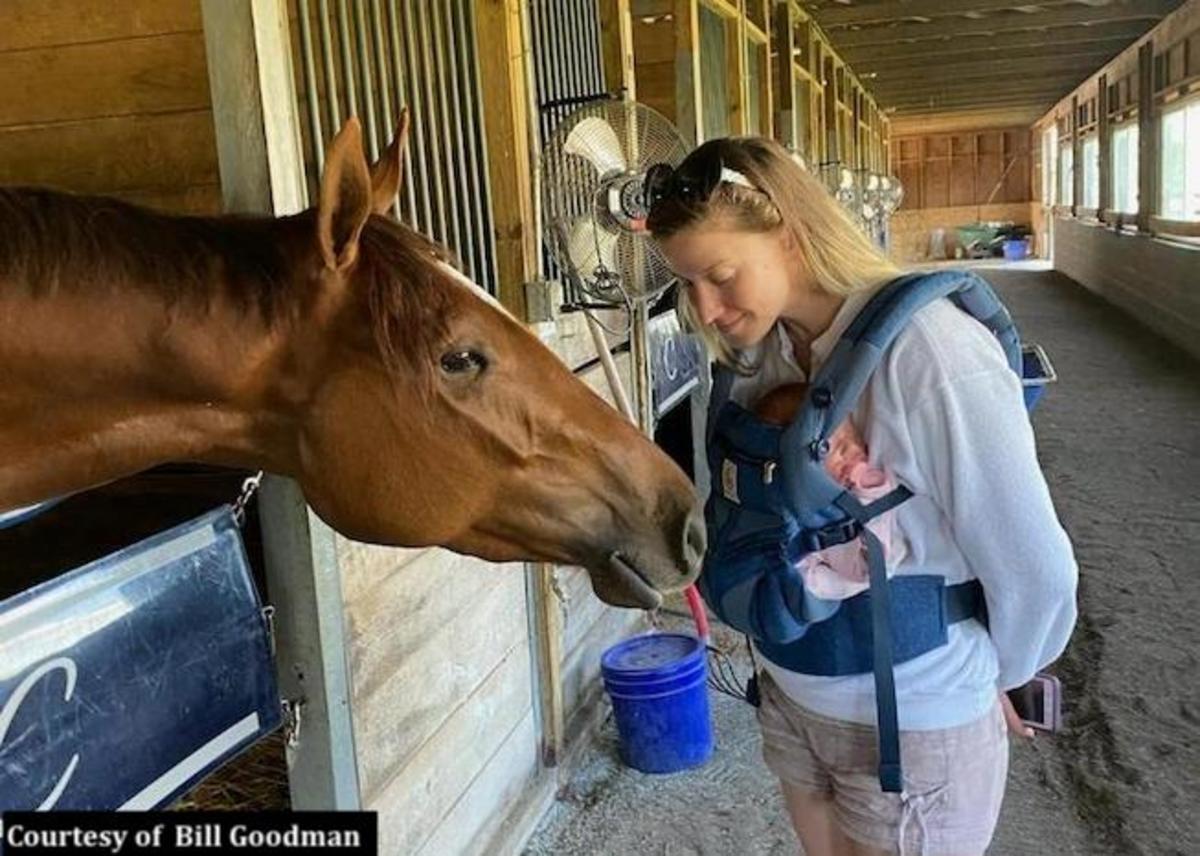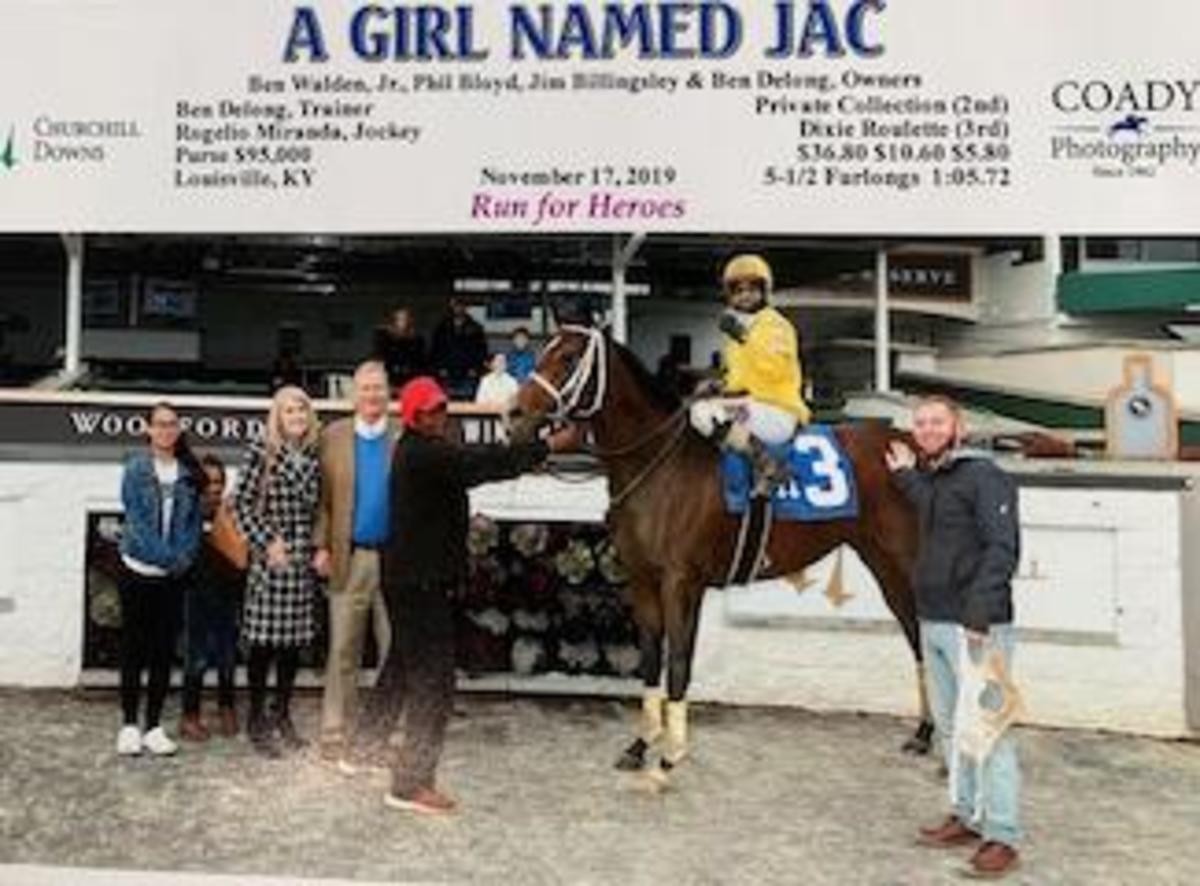In the 1979 Belmont Stakes, it was hard not to root for Spectacular Bid as he attempted to become the 12th horse in history to complete the Triple Crown.
Even James “Jimmy” Baker had a ton of respect for the 'Bid,' entering the paddock for the race as the groom of Coastal on behalf of trainer David Whiteley. Racing fans may have been disappointed when Spectacular Bid ran third that day, but Baker found himself smiling when he met Coastal in the Belmont Stakes winner's circle.
Baker has never forgotten that day. Fast forward to 2018, when he and his wife, Candie, were trying to name a handsome colt they'd purchased for $20,000 as a yearling at the previous year's Keeneland September sale.
“I always liked that name, Spectacular Bid,” Baker said. “We were trying to name this horse, and Candie has always liked the name 'Gem,' so she came up with Spectacular Gem.”
The 4-year-old son of Can the Man might not be running in the Triple Crown, but Spectacular Gem has proven himself a perfect purchase for the Bakers. Last Sunday, the colt earned the third stakes victory of his career in Ellis Park's $100,000 Kentucky Downs Preview Tourist Mile in Henderson, Ky., boosting his overall earnings to $307,281.

Spectacular Gem's connections following his win in the Tourist Mile Preview
“He's been a big, big surprise,” Candie Baker said after Sunday's win. “Jimmy has done a great job with him. He's been a really, really nice horse. He's a diamond in the rough, just hope he can keep on going.”
The Preview Tourist Mile is an automatic qualifier for the $750,000 Tourist Mile on Sept. 7 at Kentucky Downs in Franklin, Ky., and Jimmy Baker said that would be the next “logical spot” for Spectacular Gem. He'd like to try for a graded win with the colt as well, but the veteran trainer is primarily grateful to have Spectacular Gem in his barn.
“I had a lot of good years in the 1990s, and we've been piddling the last 12 years buying horses, most of them fillies — a lot cheaper, $5,000, $10,000,” Baker said. “We're just really lucky to get a horse like this. It means a lot to us because we're in the game to run. To have a horse to run in these kinds of races is just a bonus for us.”
The son of New York-based trainer George M. Baker, Jimmy Baker grew up around Thoroughbreds. His father trained a top handicap mare named Politely in mid-to-late 1960s for Allaire duPont; she won 21 of her 49 starts for earnings over $550,000.
When his father got down on horses in the 1970s, the younger Baker decided to go across the street and ask trainer David Whiteley, son of Hall of Famer Frank Whiteley, for a job.
“He looked at me and said, 'You get a haircut come and see me,'” Baker remembered. “You know, I was growing up in New York in the '70s! Well, I went right across the street and got a haircut and came right back, and he hired me.”
During the six years with Whiteley, Baker became friends with co-worker Shug McGaughey. After returning to his father's barn for a short period, Baker went to work for the future Hall of Fame trainer.
Baker was present for the careers of Hall of Fame runners Personal Ensign and Easy Goer, spending a total of five years under McGaughey's employ.
“The coolest thing for me was when Easy Goer won the Gotham,” Baker said. “He came off the van and into the stall, and you just knew he was an unbelievable horse. He wasn't acting up but he just had that demeanor about him. It was unfortunate that he came around during a tough year, with Sunday Silence.”
Baker decided to make his own path in 1989.
“Going on your own after working for people for a long time is a big change,” Baker said. “Shug sent me my first few horses, and he was instrumental in helping me get started.”
Baker's father also went to work for owner/breeder George Steinbrenner, who started to send him horses as well. One of his earliest graded stakes winners was for Steinbrenner: Spinning Round in the G2 Alcibiades at Keeneland in 1991. That filly took Baker to the Breeders' Cup as well.
Owner Robert E. Hoeweler took Baker to the Kentucky Derby a few years later with Mahogany Hall. The Woodman colt ran third in the 1994 Blue Grass Stakes, then finished ninth in the Run for the Roses. As a 5-year-old, however, Mahogany Hall really came into his own, winning the G1 Whitney Stakes at Saratoga.
“You know, when one door closes, another one opens,” said Baker. “I did really well in the '90s, then okay in the early 2000s.
“Nowadays there are a lot of young trainers out there, and everything's about stats. We're so worried about stats all the time; it should be about the horses.”
For the past six years, Baker has averaged just over 75 starts per season with between seven and 13 winners. He keeps a string at Churchill Downs and spends winters in New Orleans, and usually trains one or two of his own at a time.
“I thought about doing something else, just haven't come up with the right idea,” said Baker, laughing good-naturedly. “I tease my wife all the time that I'm gonna quit, but I love the horses. I learned that from my dad. I also have great help, they're a lot of fun to be around. At the end of the day it makes you a better horseman.”
While Candie Baker helped out at the barn every single day in the early years, she has since developed her own successful bookkeeping business with nearly 25 clients that keeps her occupied six days a week.
“We stepped up our spending a little bit and got lucky with Starlight Express ($22,000 filly who earned $104,026), and we used a little bit of that money to shop for a pricier horse,” Baker said.
Baker approached the 2017 Keeneland September sale with a top budget of $30,000, but he kept getting outbid. Candie had instructed her husband to buy a big, ugly colt, as a way of turning around their luck with nicer-looking fillies. Baker couldn't find one that fit the bill.
“I was like, 'Just find me one,'” Candie Baker remembered.
Finally, her husband called back.
“He said, 'Candie, I found you one. It's not probably what you want. It's by nothing out of nothing, but he's a good-looking colt.' I said, 'That's fine.' He really liked him, and we got him.”
Spectacular Gem is sired by Can the Man, a Grade 3-winning son of Into Mischief.
“I'd never even heard of him before that day,” Baker said. “I just knew he was by Into Mischief, who's obviously just an incredible sire.”
Baker started the colt's career in a maiden claiming race for a tag of $30,000, debuting him at Ellis Park in September of his 2-year-old season.
“I just tried to put him in the easiest spot possible first out since we owned him,” Baker explained. “Any day you come into the barn, a horse can have something wrong, you never know, so I try not to go too fast with them. That's what I learned working for Hall of Famers, you have to take your time and pay attention.”
Spectacular Gem won that first race, a six-furlong dirt contest, by 2 1/4 lengths, but he didn't win again until January, when Baker finally switched him to the grass.
With three turf stakes victories and a total of six wins from 16 starts, Spectacular Gem has more than paid his way. In return, all the colt expects is his fair share of the barn's candy stash.
“He just demands those peppermints, he'll stand there and holler for them all day long,” Baker said, admitting, “He's a little spoiled.”
The post Breeders’ Cup Presents Connections: Baker’s Patience Paying Off With ‘Spectacular’ Bargain appeared first on Horse Racing News | Paulick Report.

 Instead, he was raised around the backside of Fairmount Park in Illinois by his father, a former jockey. Delong wanted to travel as soon as he was able, so he left his home track at 17 to work the circuit between Prairie Meadows in Iowa, Remington Park in Oklahoma, and Oaklawn Park in Arkansas. Delong galloped for different trainers, freelancing early on, and eventually picked up a salary job for Wayne Catalano.
Instead, he was raised around the backside of Fairmount Park in Illinois by his father, a former jockey. Delong wanted to travel as soon as he was able, so he left his home track at 17 to work the circuit between Prairie Meadows in Iowa, Remington Park in Oklahoma, and Oaklawn Park in Arkansas. Delong galloped for different trainers, freelancing early on, and eventually picked up a salary job for Wayne Catalano.